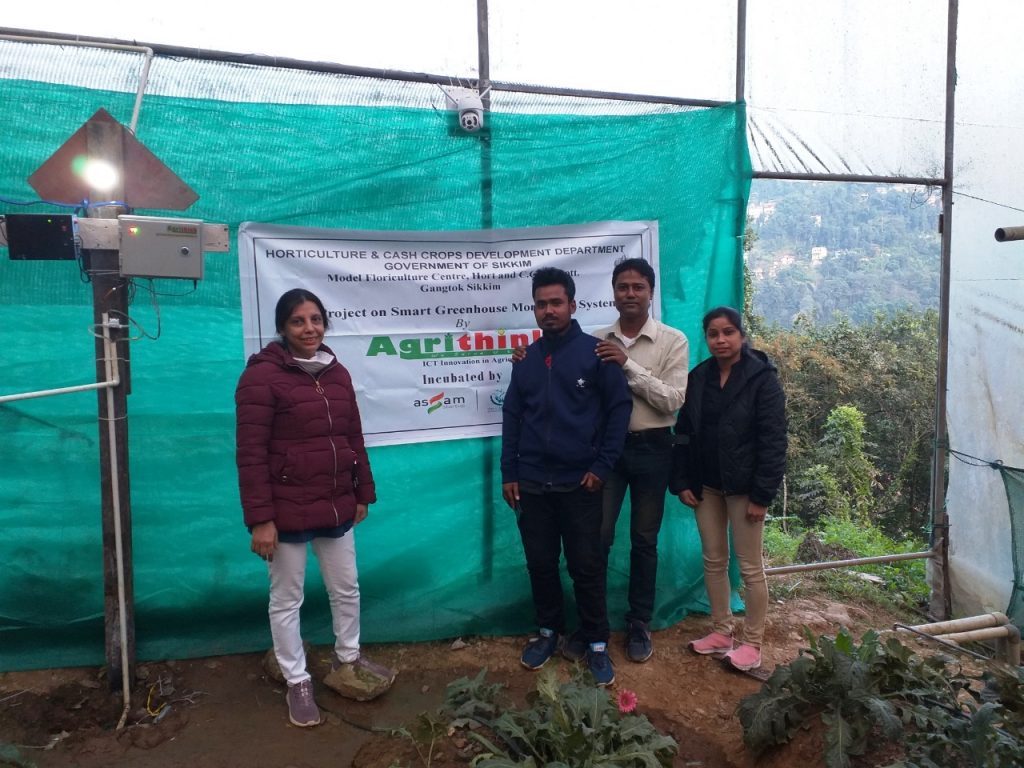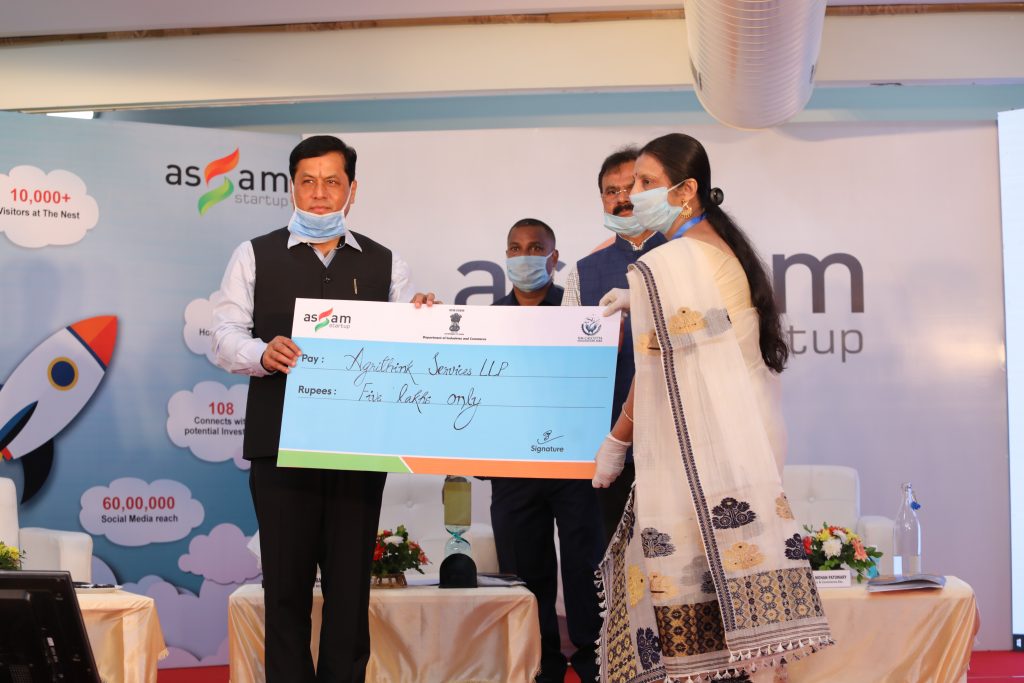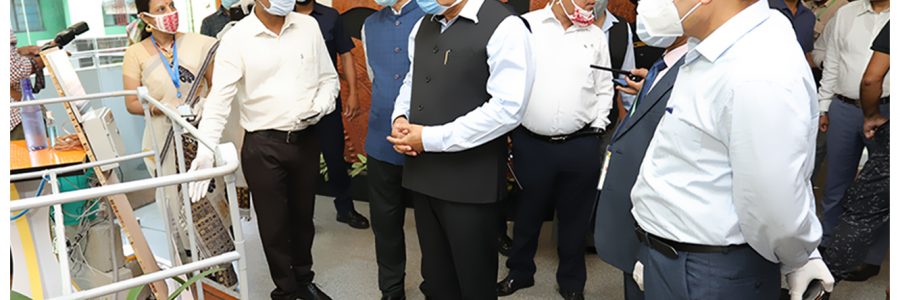In a country where agriculture forms the backbone of its economy, contributions being made to hold it upright are surprisingly scarce still. The problem lies not in the lack of capable minds, but in the hesitant attitude towards adopting more advanced methods combined with the lack of motivation to change that. There is always light at the end of a tunnel, and the time to bask in that light has arrived for our farmers. Agritech startups in India are working day in and day out to hold the backbone of our economy upright by integrating technology into the agricultural sector. Agrithink Services is one of Northeast India’s rising agritech startups that is working towards this integration and also helping farmers adapt to this revolution.
Agrithink’s main product/service is a sensor and app-based climate monitoring system called the Smart Micro-Climate Monitoring and Control System (SMMCS). One of the main challenges faced in the agricultural sector is the lack of data, which has time and again proven to be a big obstacle when it comes to providing optimal climate conditions to crops. This is one of the major reasons behind the failure of crops. With an IoT-powered system that can monitor and store data regarding parameters like temperature, moisture, and soil pH, the SMMCS is capable of monitoring any protected agricultural settings like greenhouses or mushroom cultivations. All that one needs to do is log into the app using a login ID and the ability to monitor the plantation’s micro-climate will be in their hands along with the ability to irrigate their crops when need be.
This patented revolutionary system has won Agrithink Services the attention of numerous businesses as well as individual consumers. The Sikkim Government has shown immense interest in the SMMCS along with the desire to adopt this technology for all the agricultural beneficiaries in their state once the pandemic curbs are lifted. Apart from the SMMCs, Agrithink Services is also working on a soil health management service. Dr. Bijaylakshmi Goswami, a co-founder of Agrithink Services, emphasizes the importance of soil and expresses how the lack of data regarding the various parameters of soil is a matter of concern that needs to be looked into.

In a world like the one we live in, technology has become an inseparable part of nearly every sector. There is a need for pioneers from different fields to make this revolution happen to unleash every sector’s optimum potential. Agritech startups in India, like Agrithink Services, are doing exactly that – bringing out the true potential in agriculture by steadfastly battling the challenge of getting the farmers on board to put this revolutionary integration into motion headfirst.
“We can’t sit back thinking that the farmers will not be open to these changes. How will they if we simply just feed them words and hesitate to get into the field ourselves? We need to show them how it works and that it actually works and not just push them to the point of getting overwhelmed and ultimately refusing to adopt these new changes,” Dr. Bijaylakshmi rightfully says.
The desire to be a part of this revolution was born in Dr. Bijaylakshmi, a Doctorate in Biotechnology when she became a part of a wide range of projects for SmartFusionware which exposed her to the true potential of IoT and ICT. She met like-minded people while at work, like co-founder Taufik Ahmed, and decided to jump on board to bring about tech integration into agriculture. Thus, were sown the seeds of Agrithink Services leading to its launch in the year 2019.
2020 proved to one of the hardest ever mountains to climb for people all around the world. However, for determined individuals like Dr. Bijaylakshmi and Taufik Ahmed, a challenge is by no means a reason to halt in their journey to the peak. Thanks to the founders’ hard work, Agrithink Services received the MASI grant amidst the pandemic, etching their name permanently in the book of successful agritech startups in India. Dr. Bijaylakshmi says, “When you receive recognitions as big as the MASI grant, it’s a push in the right direction. You realize that you’re on the right path and have every right to believe in yourself.” She admits to the grant truly helping them put their plans for Agrithink into motion.

In a fast-paced world with innovative minds coming up with one thing or the other at every corner, the courage to come up with something new ourselves is a big challenge. One needs to have faith in themselves to taste the air of success. On being asked if she ever faced any problems in the entrepreneurial world because of her gender, Dr. Bijaylakshmi brings to notice a very important lesson that every individual, regardless of their gender, needs to remember.
“Problems exist in every field, regardless of one’s gender. The right way to go about dealing with them is by not making them the focal point of our journey.”
Dr. Bijaylakshmi believes that even though being a woman comes with its own set of challenges, there exist some big perks too. She mentions how being a woman has helped her make a stronger impact by being one of the women pioneers in the tech world. This is exactly the kind of motivation we need to keep working towards our goals.
The pandemic might be here to stay for an indefinite amount of time, but that surely doesn’t mean we be rendered powerless to go about working towards our goals. Although it did pose some problems in the initial days of their launch concerning gaining validation from the farmers and other clients regarding their products/services, Agrithink Services is currently fully focused on putting their next service into motion and is meticulously working on it while at home. They have full faith that the startup will reach its target revenue by the end of the current year regardless of the pandemic.
Agritech startups in India are doing a wonderful job at bringing about the necessary changes to take agriculture to new heights. What comes first is putting in the best possible efforts and recognition as well as success shall follow. The co-founders fully believe that Agrithink Services is set to achieve big milestones in the coming years and become one of the most well-known agritech startups in India owing to the revolutionary services provided by them. They also believe in their startup’s potential at creating new employment opportunities. This especially aligns perfectly with Dr. Bijaylakshmi’s previous endeavors of helping women from marginalized communities find opportunities to sustain their living.
To bring a plan to fruition, no matter how well orchestrated it might be, is no child’s play. There come into play numerous factors that need pillars for support. Agrithink Services and its success so far is no different. During the initial months of its development, Assam Startup and IIM Calcutta Innovation Park proved to be the pillars for Agrithink Services. Both Taufik and Dr. Bijaylakshmi express their immense gratitude towards these organizations while admitting that all that they needed to put the plans into motion, they learned from these very organizations. They also mention the value that these names add to the startup and express their pleasure to have earned the right to be associated with these two organizations.

















